#Arianism
Text
"kill them with kindness" WRONG. Santa attack
🎅👊💥🎅👊💥🎅👊💥🎅👊💥🎅👊💥🎅👊💥🎅👊💥🎅👊💥🎅👊💥🎅👊💥🎅👊💥🎅👊💥🎅👊💥🎅👊💥🎅👊💥🎅👊💥🎅👊💥🎅👊💥🎅👊💥🎅👊💥🎅👊💥🎅👊💥🎅👊💥🎅👊💥🎅👊💥🎅👊💥🎅👊💥🎅👊💥🎅👊💥🎅👊💥🎅👊💥🎅👊💥🎅👊💥🎅👊💥🎅👊💥🎅👊💥🎅👊💥🎅👊💥🎅👊💥🎅👊💥🎅👊💥🎅👊💥 🎅👊💥🎅👊💥🎅👊💥🎅👊💥🎅👊💥🎅👊💥🎅👊💥🎅👊💥🎅👊💥🎅👊💥🎅👊💥🎅👊💥🎅👊💥🎅👊💥🎅👊💥🎅👊💥🎅👊💥🎅👊💥🎅👊💥🎅👊💥🎅👊💥🎅👊💥🎅👊💥🎅👊💥🎅👊💥🎅👊💥🎅👊💥🎅👊💥🎅👊💥🎅👊💥🎅👊💥🎅👊💥🎅👊💥🎅👊💥🎅👊💥🎅👊💥🎅👊💥🎅👊💥🎅👊💥🎅👊💥🎅👊💥🎅👊💥
206 notes
·
View notes
Note
So I know my homoiousios vs. homoousios, and my monophysite vs. dyophysite, and my monothelite vs. dyothelite, and how it all led to the Arab caliphates getting a decent navy and winning the Battle of the Masts.
I don't, and I'd love to! (If you feel like it, obviously.) I'm pretty sure the homoiousios one is about, like, the Trinity or something, but beyond that it's all Greek to me.
(At this point, I feel like I owe @apocrypals royalties or something, but I'm getting a weird kick from doing this on Saint Patrick's Day, so let's do this).
I covered the impact of the monophysite vs. dyophysite split and the Battle of the Masts here, so I'll start from the top.
You are quite correct that the homoiousios vs. homoousios split was, like most of the heresies of the early Church, a Cristological controversy over the nature of Christ and the Trinity. This is perhaps better known as the Arian Heresy, and it's arguably the great-granddaddy of all heresies.
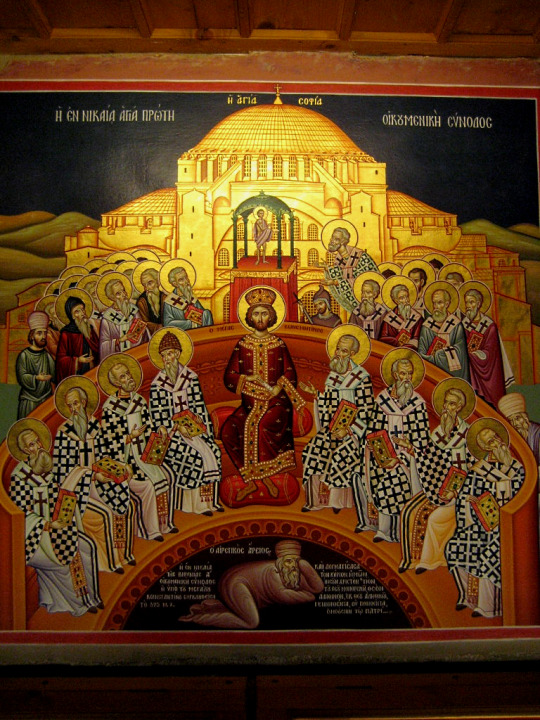
The Arian heresy was the subject of the very first Council of the early Church, the Council of Nicea, convoked by Emperor Constantine the Great in order to end all disputes within the Church forever. (Clearly this worked out well.) In part because the Church hadn't really sat down and attempted to establish orthodoxy before, this debate got very heated. Famously, at one point the future Saint Nicholas supposedly punched Presbyter Arius in the face.
What got a room of men devoted to the "Prince of Peace" heated to the point of physical violence was that Arius argued that, while Christ was the son of God and thus clearly divine, because he was created by God the Father and thus came after the Father, he couldn't be of the same essence (homoousios) as the Father, but rather of similar essence (homoiousios). Eustathias of Antioch and Alexander of Alexandria took the opposing position, which got formulated into the Nicean Creed. As this might suggest, Arius lost both the debate and the succeeding vote that followed, as roughly 298 of 300 bishops attending signed onto the Creed. This got very bad for Arius indeed, because Emperor Constantine enforced the new policy by ordering his writings burned, and Arius and two of his supporters were exiled to Illyricum. Game over, right?
But something odd happened: the dispute kept going, as new followers of Arius popped up and showed themselves to be much better at the Byzantine knife-fighting of Church politics. About ten years later, the ever-unpredictable Constantine turned against Athanasius of Alexandria (who had been Alexander's campaign manager, in essence) and banished him for intruiging against Arius, while Arius was allowed to return to the church (this time in Jerusalem) - although this turned out to be mostly a symbolic victory as Arius died on the journey and didn't live to see his readmission.
....and then it turned out that Constantine the Great's son Constantius II was an Arian and he reversed policy completely, adopting the Arian position and exiling anyone who disagreed with him, up to and including Pope Liberius. While the Niceans eventually triumphed during the reign of Theodosius the Great, Arianism unexpectedly became a major geopolitical issue within the Empire.
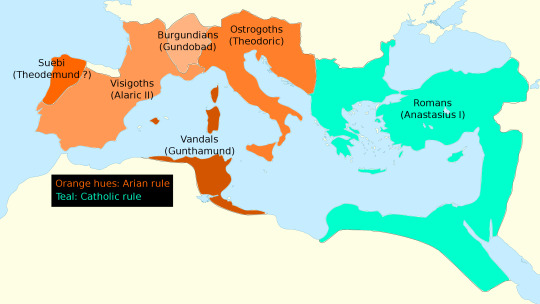
See, both during their exile and during their brief period of ascendancy within the Church, one of the major projects of the Arians was to send out missionaries into the west to preach their version of Christianity. Unexpectedly, Arianism proved to be a big hit among the formerly pagan Goths (thanks in no small part to the missionary Ulfilas translating the Bible into Gothic), who were perhaps more familiar with pantheons in which patriarchal gods were considered senior to their sons.
While they weren't particularly given to persecuting Niceans in the West, the Ostrogothic, Visigothic, Burgundian, and Vandal Kings weren't about to let themselves be pushed around by some Roman prick in Constantinople either - which added an interesting religious component to Justinian's attempt to reconquer the West.
28 notes
·
View notes
Text

#meditation#philosophy#spirituality#enlightenment#mindfulmeditation#mantra#advaita#illumination#mysticism#jesus#gnostic christianity#orthodox christianity#catholic#yahweh#god#gospel#nonduality#nondualism#oneness#unitarian#universalism#arianism
4 notes
·
View notes
Note
Nicolas of Myra for maybe possibly punching Arian in the face
uhhhh yesssss

#st nicholas of myra#arianism#catholic saint tournament#catholicism#catholic saints#catholic#christianity#theology#polls#tumblr bracket#tumblr polls#tumblr tournament
11 notes
·
View notes
Quote
The church fathers formulated the Nicene Creed in large part to address the Arian heresy that denied the unqualified deity of Jesus Christ by making him a creature. Arianism is still seen today in the theology of Jehovah’s Witnesses, Christadelphiams, and Iglesia ni Cristo.
Samples, Kenneth Richard. ‘Without a Doubt: Answering the 20 Toughest Faith Questions. p. 55
2 notes
·
View notes
Text
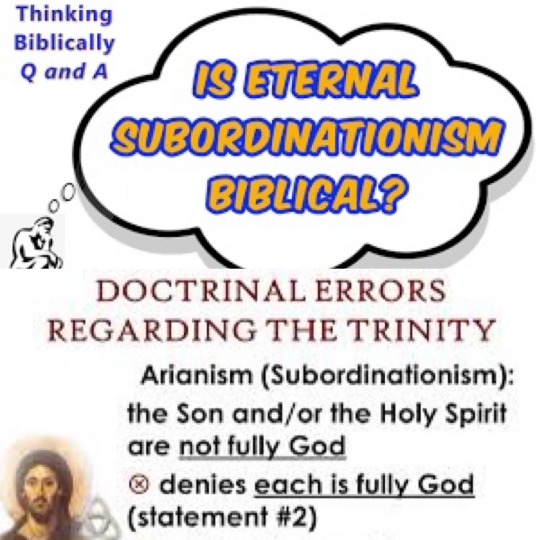
The Error of Subordinationism
By Biblical Researcher Eli Kittim 🎓
Ontological Subordinationism
The theological literature defines Subordinationism as comprising hierarchical rankings amongst the persons of the Trinity, thus signifying an ontological subordination of both the Son and the Spirit to the Father. The word ontological refers to “being.” Although some of the ante-Nicene fathers supported subordinationism, this doctrine was eventually condemned as heretical by the Post-Nicene fathers:
Athanasius opposed subordinationism, and
was highly hostile to hierarchical rankings
of the divine persons. It was also opposed
by Augustine. Subordinationism was
condemned in the 6th century along with
other doctrines taught by Origen.
Epiphanus writing against Origen attacked
his views of subordinationism. — wiki
Calvin also opposed subordinationism:
In his Institutes of the Christian Religion,
book 1, chapter 13 Calvin attacks those in
the Reformation family who while they
confess ‘that there are three [divine]
persons’ speak of the Father as ‘the
essence giver’ as if he were ‘truly and
properly the sole God’. This he says,
‘definitely cast[s] the Son down from his
rank.’ This is because it implies that the
Father is God in a way the Son is not.
Modern scholars are agreed that this was a
sixteenth century form of what today is
called, ‘subordinationism’. Richard Muller
says Calvin recognised that what his
opponents were teaching ‘amounted to a
radical subordination of the second and
third persons, with the result that the Father
alone is truly God.’ Ellis adds that this
teaching also implied tritheism, three
separate Gods. — wiki
The Eastern Orthodox position is yet another form of subordinationism that has asserted the Monarchy of the Father to this day:
According to the Eastern Orthodox view, the
Son is derived from the Father who alone is
without cause or origin. — wiki
The Catholic Church, however, is overtly antithetical to the subordinationism doctrine:
Catholic theologian John Hardon wrote that
subordinationism ‘denies that the second
and third persons are consubstantial with
the Father. Therefore it denies their true
divinity.’ — wiki
In theology proper, unlike ontological subordination, there is also the doctrine of “economic subordination” in which the Son and the Holy Spirit play subordinate roles in their functions, even though they may be ontologically equal to the Father. New Calvinists have been advancing this theory of late:
While contemporary Evangelicals believe
the historically agreed fundamentals of the
Christian faith, including the Trinity, among
the New Calvinist formula, the Trinity is one
God in three equal persons, among whom
there is ‘economic subordination’ (as, for
example, when the Son obeys the Father).
— wiki
According to the Oxford Encyclopedia, the doctrine of Subordinationism makes the Son inferior to the Father, and the Holy Spirit inferior to the Son. It reads thusly:
Subordinationism means to consider Christ,
as Son of God, as inferior to the Father.
This tendency was strong in the 2nd- and
3rd-century theology. It is evident in
theologians like Justin Martyr, Tertullian,
Origen, Novatian, and Irenaeus. Irenaeus,
for example, commenting on Christ's
statement, ‘the Father is greater than I’
(John 14:28), has no difficulty in
considering Christ as inferior to the Father.
… When Origen enlarged the conception of
the Trinity to include the Holy Spirit, he
explained the Son as inferior to the Father
and the Holy Spirit as inferior to the Son.
Subordination is based on statements
which Jesus made, such as (a) that ‘the
Father is greater than I’ (John 14:28); (b)
that, with respect to when the day of
Judgment will be, ‘of that day or hour no
one knows, not even the angels in heaven,
nor the Son, but the Father alone’ (Mark
13:32), and that He spoke of God as
somebody else (Mark 11:18). — wiki
However, Jesus’ statements are made from within the confines of his human condition, and thus they don’t pertain to his eternal status. As the Son of Man, namely, as a finite, limited human being, in comparison with the eternal Father, Jesus is obviously incapable of knowing all things. So Jesus’ statements must not be taken out of context and used to support the idea that he’s ontologically an inferior God. Micah 5.2 would certainly challenge that notion when it reveals that the messiah is actually uncreated: “His times of coming forth are from long ago, From the days of eternity.” Subordinationism ultimately leads to Arianism, the notion that the Son was created by the Father, and is not thus God:
Arius, therefore, held that the Son was
divine by grace and not by nature, and that
He was created by the Father, though in a
creation outside time. In response, the
Nicene Creed, particularly as revised by the
second ecumenical council in
Constantinople I in 381, by affirming the co-
equality of the Three Persons of the Trinity,
condemned subordinationism. — wiki
According to The Westminster Handbook to Patristic Theology, Subordinationism sees “the Son” and “the Spirit of God” as lesser deities, especially as demi-gods, or inferior gods:
Subordinationism. The term is a common
retrospective concept used to denote
theologians of the early church who
affirmed the divinity of the Son or Spirit of
God, but conceived it somehow as a lesser
form of divinity than that of the Father.
— wiki
Subordinationism is reminiscent of Gnosticism in which there’s a supreme God as well as lesser divinities. In Subordinationism, the Son is viewed as an inferior god, or a lesser god. However, as will be shown, Jesus is not a subordinate god in relation to God the Father. Some theologians argue that although the three persons of the Godhead are coequal, coeternal, and consubstantial ontologically, the Son and the Spirit are nevertheless subordinate in terms of economy, that is, in terms of their functions and roles. This notion of ranking or subordination within the trinity is supposedly supported by scripture when it says that the Father “sent” the Son (Jn 6.57), or that the Father and the Son “send” the Spirit (Jn 15.26), or that the spirit will “speak only what he hears” (Jn 16.13).
But this still implies a greater versus a lesser god, which makes the Trinity theologically indefensible! Not to mention that these verses are taken out of context. The temporal operations of the Son and the Spirit are scripturally depicted in anthropomorphic terms, ascribing human characteristics to divine operations and energies so that they can be better understood. As, for example, when scripture says that God changed his mind, or that he repented. And as regards Jesus’ connection to the God of the Hebrew Bible, appropriate New Testament language must be used so as to preclude a theological deviation from the monotheistic God of the Old Testament. Nevertheless, scripture does tell us categorically and unequivocally who Jesus is. Revelation 1.8 tells us that the Son is the Almighty! Who, then, ranks above him? Moreover, Jesus is Yahweh (the Lord) in the New Testament. Proverbs 8.28-30, John 1.3 and Hebrews 1.2 all indicate that Jesus is the creator. John 1.3 declares:
All things came into being through him
[Jesus], and without him not one thing
came into being.
Acts 4.12 reminds us of Jesus’ preeminent position within the Godhead:
there is salvation in no one else; for
there is no other name under heaven that
has been given among mankind by which
we must be saved.
In my view, subordinationism leads to tritheism!
The Eternal Subordination of the Son
The doctrine that the Son is eternally created by God the Father smacks of Arianism, as if his divinity is mediated to him by God the Father, implying that the Son doesn’t legitimately possess divinity in and of himself. It suggests that the Son and the Father were not always God in the same way, and that there was a time when the Son did not exist. Accordingly, only the Father was in the beginning. In other words, the Son is not eternal. This view holds that the Son is God only because Godhood is bestowed on him as a gift from the Father. To phrase it differently, the Son is God by grace and not by nature. Today, among the theologians who hold to Subordinationism are Bruce A. Ware, Wayne A. Grudem, and John W. Kleinig. But this doctrine contradicts John 1.1:
In the beginning was the Word, and the
Word was with God, and God was the word.
We must always remember that all of Jesus’ words must be understood within the context of the human condition. That is to say, Jesus is speaking of his human nature, as a human being, not as eternal God. He is a creature, a man, a finite being, located in time and space, and in that sense he is obviously in a subordinate relationship to the Father who remains eternal and is everywhere. So when Jesus employs the language of grace——specifying what the Father has “given” him——he is referring to what the eternal Father has done for the mortal Son of Man, namely, to give him authority, exaltation, worship, and glory (cf. Daniel 7.13-14). This apparent inequality between the Son and the Father is, strictly speaking, limited to Jesus’ humanity, a humanity which will then in turn redeem human nature and glorify his elect. It is not referring to Jesus’ ontological relationship with the Father, which is one of equality. And since he is appealing particularly to the monotheistic God of the old testament, which the Jews understood as a singular deity, Jesus is careful to use the language of grace in order to appease the Jews who would otherwise take exception to an incarnate God. But scripture is quite adamant about the fact that Jesus is both man and God! John 1.14 puts it thusly:
And the Word became flesh, and dwelt
among us.
Colossians 2.9 reveals that the Son is fully God, and that the fullness of the godhead (πᾶν τὸ πλήρωμα τῆς θεότητος) dwells in him bodily:
in him the whole fullness of the godhead
[θεότητος] dwells bodily.
Hebrews 1.3 proclaims that the Son is of the same essence as the Father:
The Son is the radiance of God’s glory and
the exact imprint of his being.
Titus 2.13 calls him “our great God and Savior Jesus Christ.” And in John 1.3 and Hebrews 1.2 Jesus is the creator and the “heir of all things, through whom he [God] also created the worlds.” That is to say, the Son of Man, in his *human nature*——as the mediator and savior of mankind——becomes heir of all things. Not that the Godhood is given to him as a gift or as an inheritance. How can a lesser god or a created being act as the ultimate judge of the universe? John 5.22 reads:
For the Father judgeth no man, but hath
committed all judgment unto the Son.
It doesn’t mean that the Son is given this office as a gift because the Son is God by nature and not by grace! How can God the Father hand over his Sovereignty to God the Son as a gift if Yahweh never yields his glory to another?
I am the LORD [Yahweh]; that is my name! I
will not yield my glory to another.
— Isaiah 42.8
How can an inferior god, a lesser god, or a created god be completely sovereign over the entire universe? In Matthew 28.18, Jesus declares:
All authority in heaven and on earth has
been given to me.
The clincher, the verse that clearly demonstrates the Son’s divine authority is Revelation 1.8. Since we are not waiting for the Father but rather for the Son to arrive, it becomes quite obvious that this is a reference to Jesus Christ:
‘I am the Alpha and the Omega,’ says the
Lord God, ‘who is, and who was, and who is
to come, the Almighty.’
In Daniel 7.14, why was the Son of Man “given authority, glory and sovereign power”? Why did “all nations and peoples of every language worship[ed] him”? If he’s a created being, why do the heavenly host prostrate before the Son in heaven? Partly because he is God, but also because of his deeds on earth. Revelation 5.12 exclaims:
Worthy is the Lamb that was slaughtered to
receive power and wealth and wisdom and
might and honor and glory and blessing!
Not that the Son doesn’t have power, or wealth, or wisdom, or honor, or glory, or blessing. But it’s as if additional exaltation is offered to him because of his achievements as a human being (as the Son of Man)! First Timothy 6.15-16 calls Christ the “only Sovereign” God and that “It is he alone who has immortality and dwells in unapproachable light”:
he who is the blessed and only Sovereign
[μόνος δυνάστης], the King of kings and
Lord of lords. It is he alone who has
immortality [ἀθανασίαν] and dwells in
unapproachable light, whom no one has
ever seen or can see.
Hebrews 1.3 reveals that the Son (not the Father) “upholds the universe by the word of his power.” Colossians 1.17 also says: “He [Christ] is before all things, and in him all things hold together” (cf. Philippians 3.21). What is more, if the Son is subordinate to the Father, then the Father is the source of life, not the Son. Yet John 14.6 says the exact opposite, to wit, that the Son is both “the truth” and “existence” itself:
Jesus said to him, ‘I am the way, and the
truth, and the life.’
Jesus also alludes to himself as Yahweh, using the ontological Divine Name “I AM” from Exodus 3.14:
Jesus said to them, ‘Truly, truly I say to you,
before Abraham was born, I am.’
— John 8.58
In Matthew 28.18, Jesus says that “All authority in heaven and on earth has been given to me” (Ἐδόθη μοι πᾶσα ἐξουσία ἐν οὐρανῷ καὶ ἐπὶ τῆς γῆς·). That means that Jesus has *ALL AUTHORITY*; not just some authority or most authority. So, if the Son possesses all authority, how is he subject to a higher authority? Consequently, there’s no one higher than him! We also know this through Special Revelation❗️
Eternal Sonship vs Incarnational Sonship
In his essay “JOHN 1:14, 18 (et al.),” Edward Andrews writes:
Literal translation philosophy versus
interpretive translation philosophy plays a
role here too. I submit that rendering
monogenēs as “only begotten” is the literal
rendering. In translating the Updated
American Standard Version (UASV), our
primary purpose is to give the Bible readers
what God said by way of his human
authors, not what a translator thinks God
meant in its place.—Truth Matters! Our
primary goal is to be accurate and faithful
to the original text. The meaning of a word
is the responsibility of the interpreter (i.e.,
reader), not the translator.
Therefore, a literal reading of monogené̄s is “only begotten” or “only-born.” However, scholars commonly argue whether the meaning of the Greek word μονογενὴς (monogenēs) is “only begotten” or “unique.” I will discuss that in a moment. Moreover, theologians have devised the doctrine of eternal Sonship, and have viewed this process as an eternal begetting, namely, the eternal begetting of the Son. That is to say, the 2nd person of the Trinity has always been the Son of God throughout all eternity. This is primarily based on the Nicene Creed (325 A.D.) which states: "We believe in one Lord, Jesus Christ, the only Son of God, eternally begotten of the Father, God from God, Light from Light, true God from true God, begotten, not made, of one Being with the Father.” However, the preposition “from” (e.g. God from God, Light from Light, true God from true God) is very problematic. So is the phrase “eternally begotten of the Father.” Both suggest that the the 2nd person is not fully God in his own right but derives his divinity eternally from the Greater God, the Father. So, for example, if the Father were to suddenly cut off the supply lines, for whatever reason, the Son would no longer be God. That’s the implication. Insofar as this language gives priority to the Father as the only true God, it suggests that the Son and Spirit are inferior and that they derive their divinity and existence from the Father. Yet Isaiah 9.6 calls the Messiah “Everlasting Father”!
In his book “Systematic Theology,” Wayne Grudem identifies one particular hermeneutical problem with these types of interpretations, namely, that they try to illustrate the eternal relationships within the Godhead based on scriptural information which only address their relationships in time. Therefore, it is both feasible and conceivable that the Bible uses the terms Father, Son, and Holy Spirit to describe the manner in which the members of the Trinity relate to humanity in space-time. For instance, the numerous references pertaining to the Father “sending” the Son into the world allude to time. Furthermore, the Father-Son-and-Holy-Spirit formula is an “analogy” to the human family and to human relationships, not an exact representation concerning the relationships of the persons within the Trinity. Moreover, the notion that the Son is “eternally begotten” of the Father is dangerously close to Arianism, which maintains that the Son of God didn’t always exist but was rather begotten by God the Father, thus implying that Jesus was not co-eternal with God the Father.
Those who take exception to the concept of eternal Sonship often espouse what is known as the doctrine of the Incarnational Sonship. While affirming the Son’s deity and eternality, this doctrine holds that he was not always the Son of God. Rather, his Sonship began when he was “begotten.” In other words, the Father-Son-and-Spirit formula only describes the manner in which the members of the Trinity relate to humanity in space-time. This means that the second person of the Trinity became the Son of God at some point in history, namely, at His incarnation. There are several nontrinitarian offshoots of this view, which hold that the second person of the Trinity was adopted as the Son of God at his baptism, his resurrection, or his ascension. This view is known as Adoptionism (also called dynamic monarchianism). Since this is a nontrinitarian formula which asserts that Christ was simply a mortal man who was later adopted as the Son of God at some point in human history, it has absolutely nothing to do with the Incarnational Sonship that I’m describing, which recognizes and affirms Christ’s deity and eternality. Advocates of this position view the Sonship of Christ as a title or a function that he historically assumed “in time,” at his incarnation. They do not view the Sonship of Christ as an essential element of “who he is” within the Trinity. The same is true of the Father. According to this view, the first person of the Trinity became the Father at the time of the incarnation.
MacArthur (who has since changed his position) originally denied that Jesus was “always subservient to God, always less than God, always under God.” He claimed that sonship is simply an “analogy.” In like manner, Ergun Caner describes Sonship as “metaphor.” Caner similarly argues that “sonship began in a point of time, not in eternity.” Other notable Christians who have taken exception to the doctrine of eternal Sonship are Albert Barnes, Walter Martin, Finis J. Dake, and Adam Clarke.
The language of Hebrews 1.5 clearly defines the relationship of the Father to the Son as beginning during Christ’s incarnation. That’s precisely why this verse is often used as proof of the Incarnational Sonship, in which the titles of Father and Son begin to be applied during a specific event that takes place at a particular point in time: “ ‘You are my Son; today I have become your Father.’ Or again, ‘I will be his Father, and he will be my Son.’ “ Thus, there seems to be an apparent subordination in the economy of God only insofar as Christ’s human nature is concerned.
Monogenēs
Scholars often argue whether the meaning of the Greek word μονογενὴς (monogenēs) is “only begotten” or “unique.” Given the view of Incarnational Sonship, in which the titles of Father and Son begin to be applied during Christ’s incarnation, the expression “the only begotten God” seemingly means “the only God who has ever been born on earth!” And in that sense it also means “unique,” or “one of its kind.” Otherwise, if we think of the Son begotten eternally of the Father, it implies that he is not God in and of himself but derives his divinity from the Father. Thus, he is not “true God from true God”!
Although the term monogenēs could mean the “only one of its kind,” the literal meaning is “only begotten” or “only born.” Given that the earliest papyri have μονογενης θεος in John 1.18, for example, monogenēs seemingly means “the only God who has ever been born in time,” or the “only-born God” (i.e. only-begotten). Put differently, no other God has ever been born in history. But the primary meaning is “only begotten,” or, literally, “only-born.” However, its meaning is commonly applied to mean "one of a kind,” or “one and only.” We can see the interplay between the two meanings in the book of Hebrews:
The word is used in Hebrews 11:17-19 to
describe Isaac, the son of Abraham.
However, Isaac was not the only-begotten
son of Abraham, but was the chosen,
having special virtue. Thus Isaac was ‘the
only legitimate child’ of Abraham. That is,
Isaac was the only son of Abraham that
God acknowledged as the legitimate son of
the covenant. It does not mean that Isaac
was not literally ‘begotten’ of Abraham, for
he indeed was, but that he alone was
acknowledged as the son that God had
promised. — wiki
Nevertheless, excerpts from Classical Greek literature, as well as from Josephus, the Nicene creed, Clement of Rome, and the New Testament suggest that the meaning of monogenēs is “only-born”:
Only-born
Herodotus [Histories] 2.79.3 ‘Maneros was
the only-born (monogenes) of their first
king, who died prematurely.’ — wiki
Herodotus [Histories] 7.221.1 ‘Megistias sent
to safety his only-born (o monogenes, as
noun) who was also with the army.’ — wiki
Luke 9:38 ‘only born (o
monogenes)’ {noun}. — wiki
Josephus, Antiquities 2.263 ‘Jephtha’s
daughter, she was also an only-born
(monogenes) and a virgin.’ — wiki
John 3.16 For God so loved the world, that
he gave his only-begotten Son (o
monogenes uios). — wiki
Nicene Creed - ‘And in one Lord Jesus
Christ, the only-begotten Son of God.’
Clement of Rome 25 [First Epistle of
Clement] – ‘the phoenix is the only one
[born] (monogenes) of its kind.” — wiki
Notice the *meaning* in the last quotation. It’s not just the only-born, but “the only one [born] of its kind”: a combination of both interpretations. And that seems to capture the meaning of *monogenes* in the New Testament. The titles of Father and Son seemingly begin when Christ is earth-begotten or earthborn:
Heb. 1:5 ‘For unto which of the angels said
he at any time, ‘Thou art my Son (uios mou
ei su), this day have I begotten thee (ego
semeron gegenneka se)’? And again, I will
be to him a Father, and he shall be to me a
Son?’ (citing Ps.2:7, also cited Acts 13:33,
Heb. 5:5) —wiki
Filioque
In the Eastern Orthodox Church, the Father is seen as Greater than the Son and the Spirit. To offset this imbalance, the Nicene creed was amended by the Roman Catholic Church with the addition of the filioque clause. The original creed from the First Council of Constantinople (381) states that the Holy Spirit proceeds "from the Father,” to which the Roman Catholic West added, “and the Son,” as an additional origin point of the Holy Spirit. Maximus the Confessor, who is associated more with the Orthodox East than with the Catholic West, didn’t take issue with the filioque. Similarly, I. Voronov, Paul Evdokimov and S. Bulgakov saw the Filioque as a legitimate theologoumenon (i.e. theological opinion)!
The reason we’re discussing the filioque is because this issue bears on the question of whether Jesus is God by nature or by grace. The Filioque was added to the Creed as an anti-Arian addition by the Third Council of Toledo (589). It is well-known that The Eastern Orthodox Church promotes the “Monarchy of the Father,” which signifies that the Father alone is the only cause (αἰτία) of the Son and the Spirit:
The Eastern Orthodox interpretation is that
the Holy Spirit originates, has his cause for
existence or being (manner of existence)
from the Father alone as ‘One God, One
Father’, Lossky insisted that any notion of a
double procession of the Holy Spirit from
both the Father and the Son was
incompatible with Eastern Orthodox
theology. — wiki
The view of the superiority of the Father actually finds expression in both east and west:
The Fourth Council of the Lateran (1215):
‘The Father is from no one, the Son from the
Father only, and the Holy Spirit equally from
both.’ — wiki
This view leads to Arianism, as can be seen from the seventeenth ecumenical council:
The Council of Florence, session 11 (1442),
in Cantate Domino, on union with the Copts
and Ethiopians: ‘Father, Son and holy Spirit;
one in essence, three in persons;
unbegotten Father, Son begotten from the
Father, holy Spirit proceeding from the
Father and the Son; ... the holy Spirit alone
proceeds at once from the Father and the
Son. ... Whatever the holy Spirit is or has, he
has from the Father together with the Son.’
— wiki
This implies that both the Son and the Holy Spirit are not God by nature but by grace. Thus, they’re not fully God: they’re inferior, lesser gods, created eternally by the Father so to speak. This smacks of Arianism and contradicts scripture which states that “in Christ all the fullness of the Deity lives in bodily form” (Colossians 2.9). Conversely, Eastern Orthodoxy tends to put the Father on a pedestal:
In Eastern Orthodox Christianity theology
starts with the Father hypostasis, not the
essence of God, since the Father is the God
of the Old Testament. The Father is the
origin of all things and this is the basis and
starting point of the Orthodox trinitarian
teaching of one God in Father, one God, of
the essence of the Father (as the uncreated
comes from the Father as this is what the
Father is). — wiki
Conclusion
It doesn’t appear as if there are hierarchical rankings amongst the persons of the Trinity, comprising an ontological subordination of both the Son and the Spirit to the Father. To say that “the Son is derived from the Father who alone is without cause or origin” is nothing short of Arianism. As Catholic theologian John Hardon put it, subordinationism denies that the Son and the Spirit are consubstantial with the Father. Thus, it denies their divinity. This doctrine can be construed as if Christ, the Son of God, were inferior to the Father. It would also invalidate the three coequal, coeternal, consubstantial divine persons of the Trinity. The New Testament also makes it abundantly clear that Jesus is Yahweh (i.e. the Lord) and the almighty (see Revelation 1.8)!
It’s also clear that there’s no eternal Sonship in which Christ is eternally begotten. The appellations of Father and Son relate to the economy of God as it pertains to the Incarnation of Christ (cf. Hebrews 1.5). And *monogenēs* doesn’t seem to mean that the Son is eternally begotten and ontologically subordinate to the Father. Rather, it seems to denote the only God who has ever been born in time, or the “only-born God” (i.e. only-begotten). That is to say, no other God has ever been born in human history. So, as the Son of Man, Christ can be described as both “unique” and as the “only begotten.”
Finally, it should be stressed that Jesus is God by nature, not by grace which suggests Adoptionism. The Filioque was added to the creed as an anti-Arian formula to offset the “Monarchy of the Father,” which signifies that the Father alone is the only cause (αἰτία) or principle of the Son and the Spirit. However, there’s no basis for claiming an ontological inequality within the Trinity. What is more, it’s *a contradiction in terms* to speak of an inferior and a superior God. God is God. And there’s only one God. Therefore, if we don’t want to fall into heresy, we must maintain the concept of the Trinity, which affirms the existence of one God in 3 coequal, coeternal, consubstantial divine persons who share one essence (homoousion)!
#ontologicalsubordination#arianism#eternalSonship#monogenēs#subordinationism#IncarnationalSonship#EternalSubordination#μονογενὴς#adoptionism#εκ#ελικιτίμ#economicsubordination#heresy#το_μικρό_βιβλίο_της_αποκάλυψης#theology proper#begotten#Filioque#evangelicaltheologians#thelittlebookofrevelation#ecclesiology#eternallybegotten#trinity#elikittim#PostNicenefathers#ek#Eternalfunctionalsubordination#EasternOrthodoxtheologians#anteNicenefathers#Catholictheologians#father son holy spirit
9 notes
·
View notes
Text
The Merovingians
We’ll be taking a short dive into the Merovingians. These Frankish kings ruled during the Dark Ages, 5th century AD. They ruled for over 250 years. After their reign was over, they were replaced by the Carolingian dynasty. Plus some religious conspiracies. Hope y’all enjoy this!
The Merovingians got their name from Merowig or Merovech. A Salian Frank who lived from 447 AD – 457 AD. His son,…
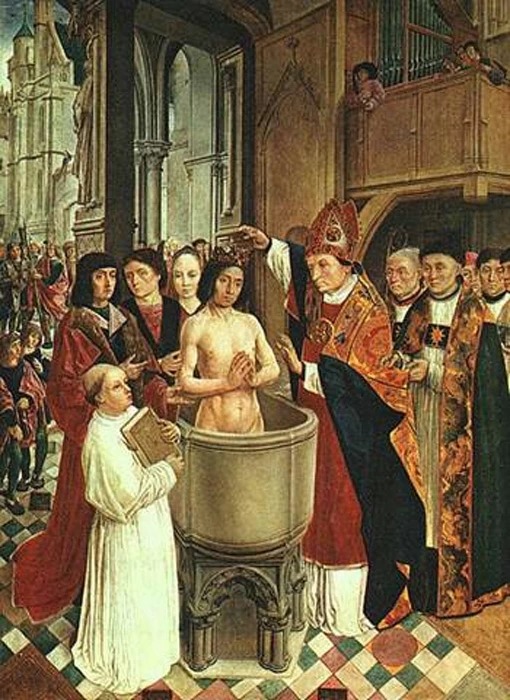
View On WordPress
#5th century#Alamanni#Arianism#Bishop of Reims#Carolingian#Catholic Orthodox#Childeric I#Chlodio#Christian#Crucifixion#Dark Ages#divine right#dynasty#England#France#Franks#Germanic#Hebrew#Holy Grail#Jesus#Joseph of Arimathea#King Clovis I#King David#King Solomon#Mary Magdalene#Merovech#Merovingians#Merowig#Neptune#Nicene Creed
2 notes
·
View notes
Text





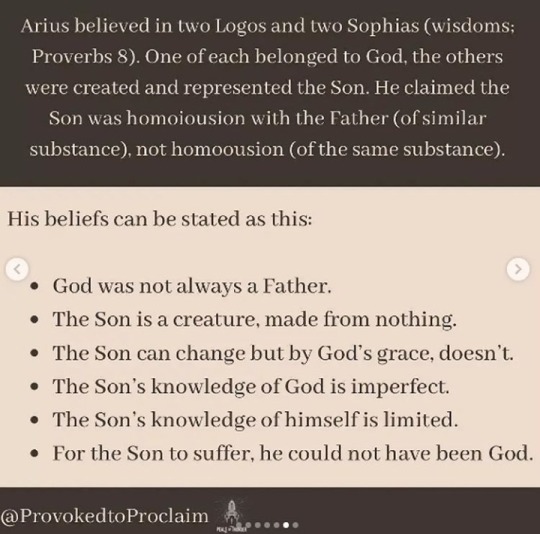
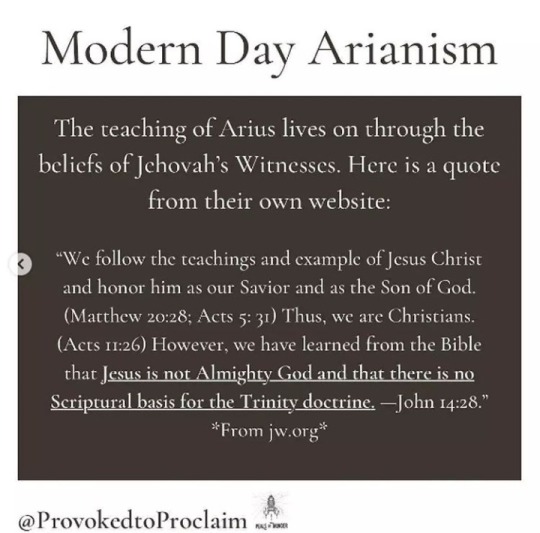
#early church heresy#arianism#christian blog#christianity#christians#false teacher#ProvokedtoProclaim
1 note
·
View note
Text
If the Trinity of Persons is False, Why did God Allow it to Prevail in the Christian Church?
In a question on Christianity StackExchange here, a user asks:
According to non-Trinitarians, if God’s nature is not adequately portrayed by trinitarian theology, then why did God allow such an erroneous understanding of His nature to become so widespread among the members of the Church, the Bride of His Son? If God has the power and the prerogative to intervene in historical events, then why…
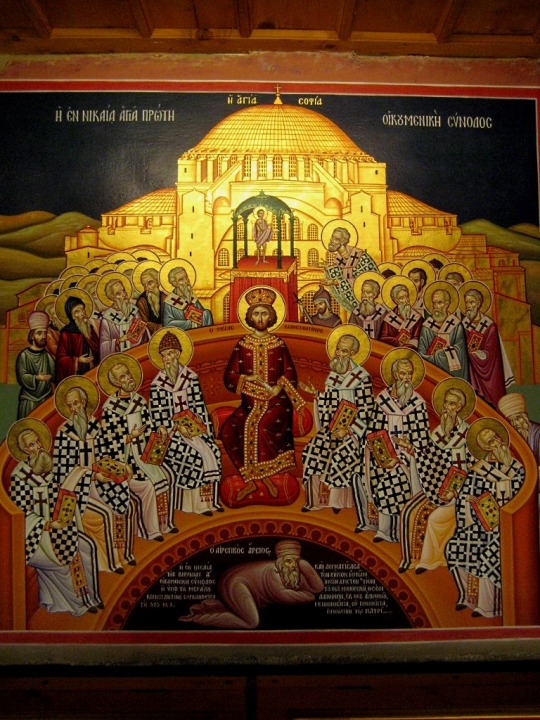
View On WordPress
#Arianism#Christianity#Constantine#Constantine the Great#Council of Nicaea#doctrine of the Trinity#Peter#the Trinity#Trinity#Trinity of Persons
1 note
·
View note
Video
youtube
Arianism, Heresy & The Council of Nicea
0 notes
Text
Arius meeting St. Nicholas at the Council of Nicea...

0 notes
Text
Monotheism

View On WordPress
0 notes
Text

This isn’t cute. Lesbians only draw their favs as medieval knights when they’re catastrophically smitten
#Signalis#i’m in trouble#i have not learned to draw ariane yet so she gets to be a blood ghost#elster#ariane yeong
4K notes
·
View notes
Text

based on this pic.
4K notes
·
View notes
Text
8+ months of animating ariane and only now i realized the uniform doesn't have a skirt. do not act unwise
6K notes
·
View notes
Text


The red eye in the sky made me think of the mal de ojo
5K notes
·
View notes